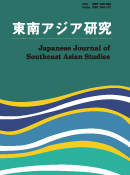
- 2 号 p. 109-
- 1 号 p. 3-
- |<
- <
- 1
- >
- >|
-
―西部カリマンタンのダヤック人王権の事例から―西島 薫2020 年57 巻2 号 p. 109-135
発行日: 2020/01/31
公開日: 2020/01/31
ジャーナル フリーThe Bosi Koling Tongkat Raya’at, a sacred heirloom of the Ulu Ai’, a Dayak king in western Kalimantan, plays an essential role in shaping an indigenous polity. Previous studies on kingship in Southeast Asia tend to explain the institutional structures of kingships by identifying them with structures of kinship groups. However, many indigenous polities of Southeast Asia, including the Ulu Ai’, track their origins back to incestuous marriages of mythical primordial siblings, which clearly contradicts kinship norms. This paper examines the two predominant variations of the origin myths, both indicating that the office of the Ulu Ai’ cannot be understood in relation to kinship groups. Second, this paper shows that the polity of the Ulu Ai’ consists of face-to-face networks connecting the sacred heirloom and the people worshipping its paramount sacredness. This polity becomes tangible only when worshippers congregate at the house of the Ulu Ai’ for the heirloom purification ritual. This paper concludes that the polity of the Ulu Ai’ consists not of kinship groups but rather of dormant networks of the heirloom, Ulu Ai’, and the worshippers, which take the form of active polity only when the king conducts the ritual.
抄録全体を表示PDF形式でダウンロード (1163K) -
―文字文化と信仰の不可分な関係―藤村 瞳2020 年57 巻2 号 p. 136-165
発行日: 2020/01/31
公開日: 2020/01/31
ジャーナル フリーWhile Protestantism brought modernity to indigenous peoples, it sometimes created new types of confusion in local society. Previous literature on the Karen Baptist mission in nineteenth-century Burma tended to focus on missionaries’ devising Karen scripts and orthographies, depicting this as the major modern influence of Christianity on Karen speakers. Yet, it is also essential to examine how the invented orthography and printed materials were utilized by Karen evangelists in their oral preaching, in order to understand the vast influence of literacy in the Protestant mission more holistically.
Analyzing various historical sources in Sgaw Karen from the 1840s, this paper reveals how a set of the Christianized Sgaw Karen vocabulary and expressions was created along with the Bible translation. This new Karen lexicon, heavily reflecting the Christian worldview, was used by Karen evangelists in their preaching. The use of the new Karen lexicon meant that incomprehensible literacy and narration emerged in the Karen world, generating a lexical gap between the converted and non-Christians. That the new incomprehensible narration was pivotal in the mission to preach God’s word suggests that modern Karen literacy, despite its modernity, emerged in the Karen world as something inseparable from a particular religion, that is, Christianity.
抄録全体を表示PDF形式でダウンロード (1082K) -
井口 由布, ラシド アブドゥル2020 年57 巻2 号 p. 166-189
発行日: 2020/01/31
公開日: 2020/01/31
ジャーナル フリーThis study situates “female genital mutilation (FGM)” in Malaysia in the politics of the female body and sexuality in post-colonial societies. There has been a global dispute over “FGM,” centering on the opposition between human rights and the protection of local culture. In order to overcome the deadlock, in the 1990s several studies started to view the dispute as the politics of discourse in the Foucaultian sense. Some of them argued that the female body was restructured as an object of reproductive health in the system of state medicine. Considering the studies mentioned above, this paper argues how the discourses on “FGM” (either in favor or against) promote the domination of the female body and sexuality in Malaysia. This study shows that the medical scientific perspective was predominant in religious as well as academic discourses. This might indicate the medical control of sexuality and the female body through the construction of discourses concerning “FGM” in Malaysia. In contrast to the religious and academic discourses, rural people in Malaysia view “FGM” as an unconscious practice deeply embedded in their communities. They do not know about the existence of the practice in African countries. This shows that there is a huge gap between academic discourses and local discourses on “FGM” in Malaysia.
抄録全体を表示PDF形式でダウンロード (958K)
-
立本 成文2020 年57 巻2 号 p. 190-192
発行日: 2020/01/31
公開日: 2020/01/31
ジャーナル フリーPDF形式でダウンロード (1031K) -
岸本 美緒2020 年57 巻2 号 p. 192-195
発行日: 2020/01/31
公開日: 2020/01/31
ジャーナル フリーPDF形式でダウンロード (1016K) -
倉沢 愛子2020 年57 巻2 号 p. 195-197
発行日: 2020/01/31
公開日: 2020/01/31
ジャーナル フリーPDF形式でダウンロード (1011K) -
小林 寧子2020 年57 巻2 号 p. 198-202
発行日: 2020/01/31
公開日: 2020/01/31
ジャーナル フリーPDF形式でダウンロード (1027K) -
森山 幹弘2020 年57 巻2 号 p. 202-204
発行日: 2020/01/31
公開日: 2020/01/31
ジャーナル フリーPDF形式でダウンロード (1021K) -
小池 誠2020 年57 巻2 号 p. 204-207
発行日: 2020/01/31
公開日: 2020/01/31
ジャーナル フリーPDF形式でダウンロード (1024K) -
森下 明子2020 年57 巻2 号 p. 207-210
発行日: 2020/01/31
公開日: 2020/01/31
ジャーナル フリーPDF形式でダウンロード (1011K) -
安里 和晃2020 年57 巻2 号 p. 210-214
発行日: 2020/01/31
公開日: 2020/01/31
ジャーナル フリーPDF形式でダウンロード (1050K) -
白石 さや2020 年57 巻2 号 p. 214-216
発行日: 2020/01/31
公開日: 2020/01/31
ジャーナル フリーPDF形式でダウンロード (1020K)
- |<
- <
- 1
- >
- >|